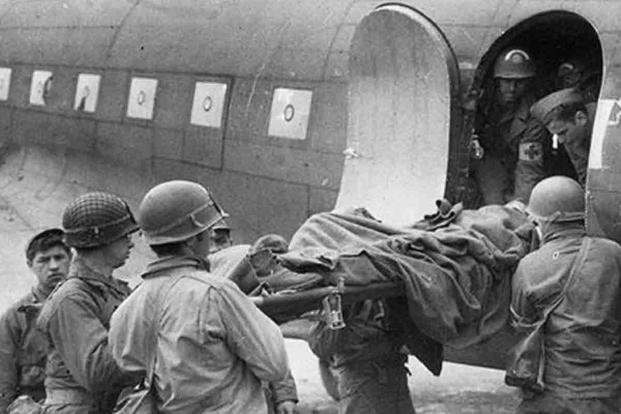Reba Whittle was ready to join the Army Nurse Corps long before the United States entered World War II. She had no idea that before the war was over, she would earn a place in World War II history but never be recognized for it in her lifetime.
After graduating from college and studying at a specialty nursing school in San Antonio, she received her commission in the U.S. Army in June 1941. Now 2nd Lt. Whittle, she performed her duties stateside as the U.S. entered the war. She signed on to train as a flight nurse in 1943.
Flight nurses are the champions of medical care in the skies, especially for wounded troops returning from the front. Any soldier too wounded to stay in the theater will be loaded onto departing aircraft, prepped and cared for by flight nurses. During World War II, flight nursing was still a young concept, but by the end of the war, it was recognized as a must-have.
There were no doctors aboard the flights, and the nurses took on duties usually reserved for doctors. Add on the idea that the plane might be attacked on the way to pick up patients, and it became a dangerous, high-pressure job.
By January 1944, Whittle was based in England, flying with troops from the front lines of Europe back to the safety of the English countryside. She flew more than 40 missions aboard Douglas C-47 Skytrains between January and September 1944.
By the end of September of that year, Allied forces had liberated Belgium, and its government had returned to Antwerp from London. American troops already had reached the Siegfried Line, Germany’s outer defense system, and casualties from Operation Market Garden were pouring in from the Netherlands.

On Sept. 27, Lt. Whittle’s C-47 was headed for a collection point near St. Trond, Belgium. Somehow it had flown some 40 miles off course and entered the outskirts of Aachen, Germany. Her aircraft, not having landed and taken on its precious cargo of wounded soldiers, still was carrying supplies into the theater, so it wasn’t marked as a medical flight. It was basically a lone target, flying into enemy territory.
As it approached Aachen, the skies opened up with German flak fire, riddling the aircraft with shrapnel, killing one pilot and wounding the other. Whittle also was wounded in the attack, and the plane went down. As the wounded crew escaped the burning wreck, they were captured by German soldiers.
After being treated for their wounds, they were driven to a nearby hospital where Whittle, the lone woman on the flight and the only American woman ever captured by the enemy in the European Theater of World War II, was informed that no one really knew what to do with a female prisoner.
She was transferred to a British-run hospital at the Nazi prisoner of war camp Stalag IX-C, where her nursing skills were put to work. The International Red Cross informed the U.S. State Department about her status as a prisoner, and she eventually was released to the Allies in January 1945.
Once back with the U.S. Army, she received the Purple Heart for her wounds and an Air Medal for her service in treating wounded soldiers. She was put on convalescent leave, taken off flying status and then transferred to California, where she continued her service as an Army nurse -- and that was all. After getting married, she applied for a discharge.
The Army determined that the reason for her discharge had nothing to do with physical disabilities related to the crash, even though Whittle suffered from recurring headaches for the rest of her life. As time went on, she began to suffer the effects of post-traumatic stress disorder, arthritis in her spine and the side effects of what we know today as traumatic brain injury. Whittle applied for VA benefits but was turned down.
In 1950, Whittle began the appeals process to get a military retirement. It took four years before the Veterans Administration recognized her disabilities. The sticking point was the reason she left active duty. After years of waiting, an Army Physical Disability Appeal Board finally determined her discharge was related to her injuries.
Even then, they determined her injuries, which included taking flak above a German city and surviving a plane crash before being held in a POW camp, were not combat related, so she only received back pay to the date she filed her appeal. The difference between the dates was worth roughly $140,000 (adjusted for inflation).
Though she made no more attempts to collect her due retirement pay and died of cancer in 1981, her husband, retired Col. Stanley Tobiason, continued to fight for her recognition as a prisoner of war.
After the Army recognized the nurses captured by the Japanese in 1983, Tobiason took up the cause once more. That same year, Whittle was given prisoner of war status and was awarded the Prisoner of War medal in 1997.
-- Blake Stilwell can be reached at blake.stilwell@military.com. He can also be found on Twitter @blakestilwell or on Facebook.
Want to Learn More About Military Life?
Whether you're thinking of joining the military, looking for post-military careers or keeping up with military life and benefits, Military.com has you covered. Subscribe to Military.com to have military news, updates and resources delivered directly to your inbox.
















